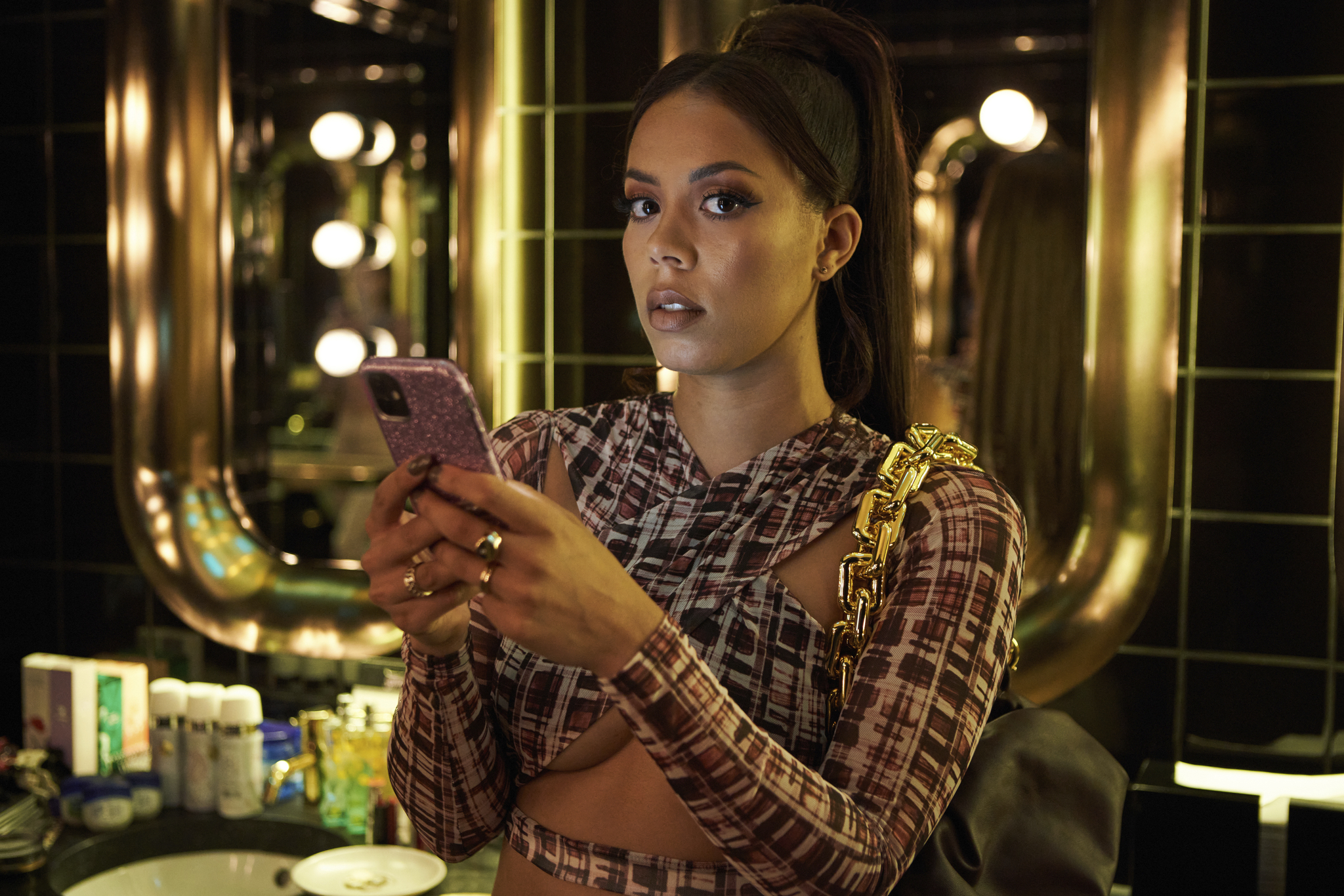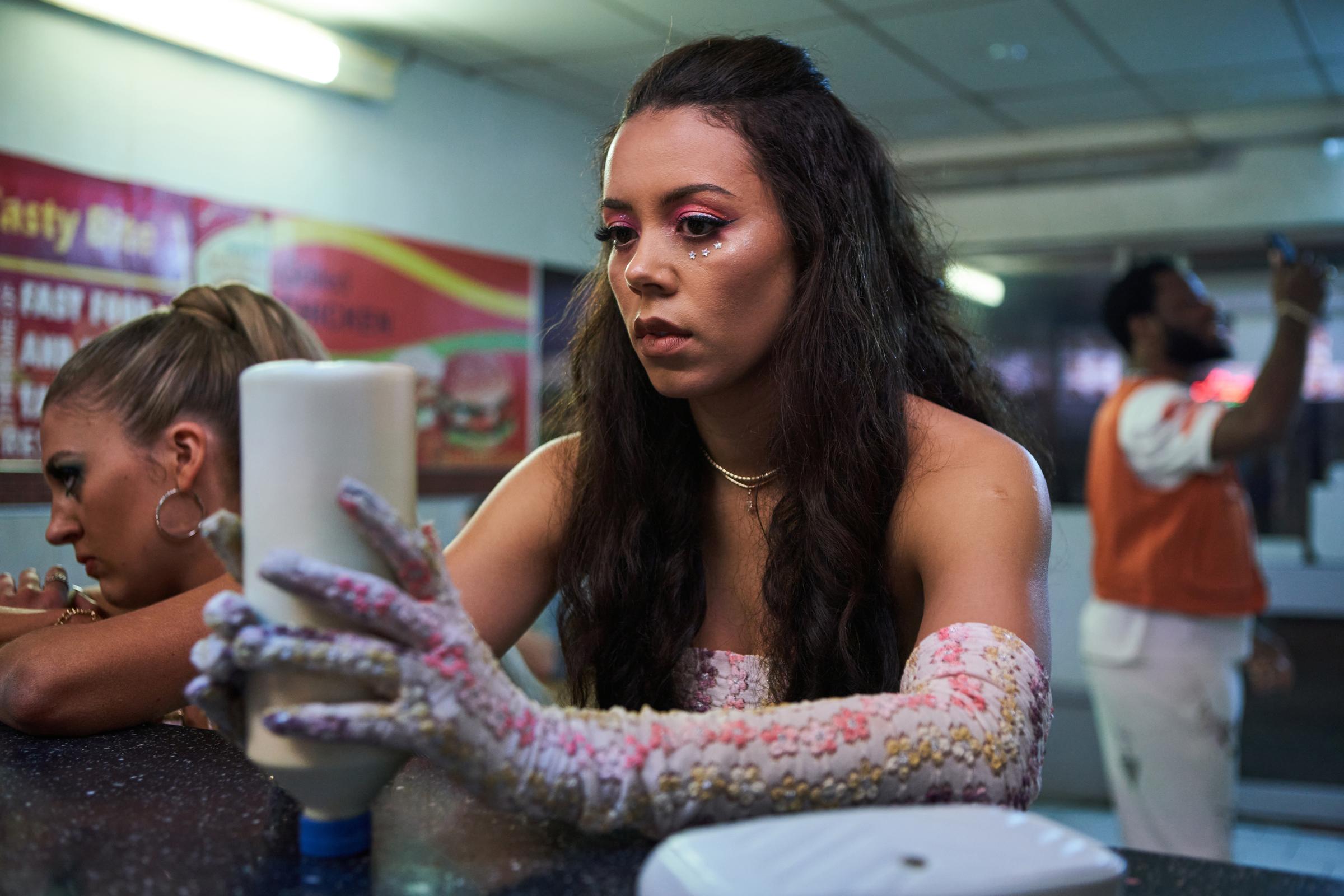
For a young artist with dreams of conquering the world, the gulf between aspiration and reality can seem unbridgeable. In fact, it usually is. So how is a person supposed to make a life for herself when she’s talented but also broke, lonely, self-destructive, decidedly unfamous, and the only career path that appeals is to somehow become the next Beyoncé? Mood, a six-part British musical drama that premieres Nov. 6 on BBC America and AMC+, is executive producer, writer, and star Nicôle Lecky’s inventive and empathetic attempt to chart a course.
Try not to judge its heroine too harshly at first glance. We meet 25-year-old songwriter and aspiring pop star Sasha Clayton (Lecky, a Sense8 alum) on what might be the worst day of her life. After waking from a nightmare, she makes a frantic effort to piece together the events of the previous evening; clues include black smudges on her hands, the remains of greasy takeout, and dozens of missed calls and desperate texts to her ex-boyfriend, Anton (Jordan Duvigneau). Because she still lives with her mother (Jessica Hynes), stepfather (Paul Kaye), and teenage half-sister (Mia Jenkins)—who are already sick of her lying, weed-smoking, and clambering in drunk at all hours—they’re all present when a police officer shows up to question her about a fire that “someone” set in Anton’s garden. The the stepdad informs Sasha that the family is moving, without her. A physical fight breaks out. Suddenly, she has no place to live.
A period of increasingly desperate couchsurfing leaves her with little choice but to move in with a new acquaintance—a gorgeous, charismatic Instagram influencer who calls herself Carly Visionz (Brave New World’s Lara Peake). With her designer wardrobe, glamorous social calendar, and adoring followers, Carly lives the life of Sasha’s fantasies. So what if she pays for it by making X-rated videos for subscribers on an off-brand version of OnlyFans? Ambivalent about sex work but dazzled by the lifestyle it supports, Sasha ignores many red flags as she grows closer to Carly and drifts farther from her dream of becoming a major recording artist, instead of just dressing like one.

Mood fits snugly into a TV landscape that has been reshaped, over the past decade, by female creators attuned to both a uniquely millennial brand of feminism and a uniquely millennial experience of aimlessness. Like Issa Rae’s hip-hop dramedy Rap Sh!t, Mood situates characters at the intersection of the music industry, social media, and sex work, where dollar signs dissolve boundaries. Like Phoebe Waller-Bridge’s Fleabag and Michaela Coel’s Chewing Gum, it’s an adaptation of a solo stage show that marks the arrival on TV of a multitalented artist with something profound to say about being a young woman in the UK right now. And like Rachel Bloom’s Crazy Ex-Girlfriend—minus the novelty-track quirk—it reveals its protagonist’s interior world through original songs and musical numbers that unfold mostly in her imagination.
Though it’s easy to guess at Lecky’s influences, her natural, nuanced performance and Sasha’s depth of character ensure that Mood never comes across as derivative. There’s no denying that Sasha can be narcissistic and defensive and arrogant, that she lies to get what she wants and lashes out when she doesn’t, that she wants to reap all the rewards that come with artistic achievement without putting in any of the requisite effort. But she’s also a biracial woman who feels like an outsider in her all-white family; Sasha’s mom doesn’t even understand why they can’t use the same hairstylist. Her breakup with Anton isn’t as simple as it seems. And her fear of rejection—or maybe just of being perceived—keeps her from performing in public.

Yet Sasha’s latent capacity for growth comes through in her introspective music. Each episode is punctuated by eloquent, self-aware songs that straddle pop, R&B, and hip-hop. At a benefits office in London’s East End, she strikes up a jaunty tune that redirects bureaucrats’ open disdain for the poor at the do-nothing government employees themselves. In a quieter moment, Sasha envisions herself as a lounge singer, serenading her indifferent family with the heartbreaking lamentation, “I’m nobody’s favorite.”
Lecky has an ear for the absurdities of spoken language in the age of the influencer, too. “This is a sponsored outfit,” Carly explains, straight-faced, to the stranger she recruits to photograph her and Sasha at the gym. As in real life, cynicism, hypocrisy, and performative positivity infect social media like a virus. Sasha’s sister Megan, who idolizes Carly, enthuses that “she doesn’t let anyone police her naked body.”
If the show isn’t quite the same tour de force as Coel’s and Waller-Bridge’s debuts, blame the pacing. Mood moves slowly in its first half, then rushes a resolution in the finale that hews a bit too closely to the prototypical tropes of the trauma plot. But the penultimate episode, a standalone psychological thriller set amid a harrowing “girls trip,” is as masterly an hour of TV as I’ve seen this year. The chaotic chemistry between Lecky and Peake, who’s fantastic as a party girl with a dark side, makes their many scenes together riveting. As the two women’s relationship develops into something more codependent and complex, it becomes clear that deciding who you don’t want to be is a crucial part of figuring out who you are. “I am just trying to live my truth,” Sasha glibly announces in the premiere. She doesn’t know yet how much hard work that will take.
More Must-Reads from TIME
- Cybersecurity Experts Are Sounding the Alarm on DOGE
- Meet the 2025 Women of the Year
- The Harsh Truth About Disability Inclusion
- Why Do More Young Adults Have Cancer?
- Colman Domingo Leads With Radical Love
- How to Get Better at Doing Things Alone
- Michelle Zauner Stares Down the Darkness
Contact us at letters@time.com